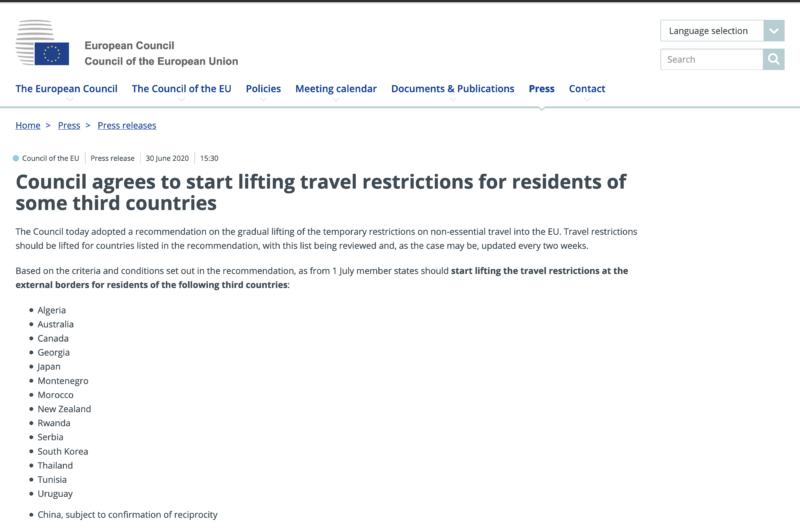Yesterday, The Council of Europe took steps to allow the gradual lifting of the temporary restrictions on non-essential travel into the European Union.
Residents of the following countries should be able to travel to the EU from the 1st of July 2020.
- Algeria
- Australia
- Canada
- Georgia
- Japan
- Montenegro
- Morocco
- New Zealand
- Rwanda
- Serbia
- South Korea
- Thailand
- Tunisia
- Uruguay
- China (subject to confirmation of reciprocity)
The country list will be reviewed every two weeks. Notably, countries such as Brazil, Russia and the United States of America are NOT on this list and as such, cannot travel to the EU for non-essential travel. For unless they meet the following exemptions:
- EU citizens and their family members
- long-term EU residents and their family members
- Travellers with an essential function (medical workers, humanitarian workers etc).
The European Council will update these recommendations every two weeks, based on the following
- The number of new COVID-19 cases over the last 14 days and per 100 000 inhabitants close to or below the EU average (as it stood on 15 June 2020)
- a stable or decreasing trend of new cases over this period in comparison to the previous 14 days
- the overall response to COVID-19 taking into account available information, including on aspects such as testing, surveillance, contact tracing, containment, treatment and reporting, as well as the reliability of the information and, if needed, the total average score for International Health Regulations (IHR). Information provided by EU delegations on these aspects should also be taken into account.
It’s important to note that this is a recommendation by the European Commission and such, not a legally binding instrument forcing them to open their borders. Ultimately, it will be the EU’s member states themselves who will decide if to follow these recommendations.
Challenges for carriers and hotels will remain
No doubt, some might have hoped the EU would choose to be leaner and let some additional countries in.
However, that has not come to past, with the European Commission examining evidence and trends of COVID-19 as part of their decision making if countries can enter the bloc.
For airlines and hotels hoping to benefit off those long haul or not so long haul passengers, there will have to be a pivot to attempt to tempt travellers from the countries listed (as well as within the EU) to explore and relax.
With airlines in Europe focusing on building out their European networks first, then turning their attention to the long haul traffic segment – it seems this move was the one that could keep them going over the summer.
It remains to be seen however if there is a desire yet for long-haul tourism traffic, however – something that carrier and hotels would want to overcome.
Welcome to Economy Class and Beyond – Your no-nonsense guide to network news, honest reviews, with in-depth coverage, unique research as well as the humour and madness as I only know how to deliver.
Follow me on Twitter at @EconomyBeyond for the latest updates! You can follow me on Instagram too!
Also remember that as well as being part of BoardingArea, we’re also part of BoardingArea.eu, delivering frequent flyer news, miles and points to the European reader.
